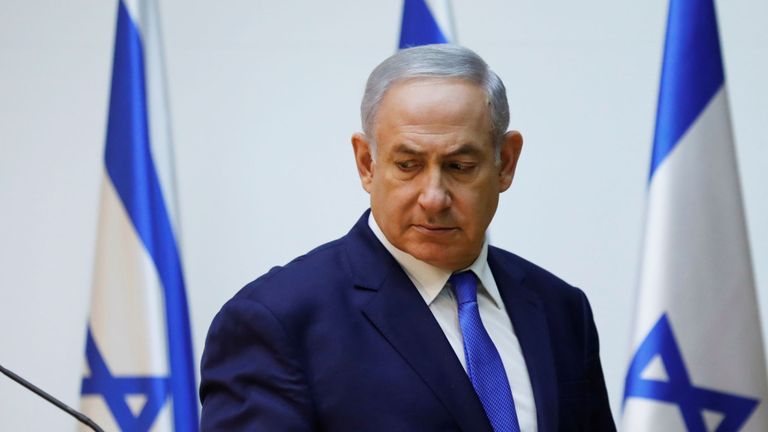Israeli Prime Minister Benjamin Netanyahu fell short of securing a parliamentary majority with his religious and nationalist allies in national elections today, setting the stage for a period of coalition negotiations that could threaten his political future and clear the way for him to be tried on corruption charges.
Initial results posted by Israel’s three major stations showed challenger Benny Gantz’s centrist Blue and White party tied or with a slight lead over Netanyahu’s Likud.
While the results do not guarantee that Gantz will be the next prime minister, they signaled that Netanyahu, who has led the country for over 10 years, could have trouble holding on to the job.
Addressing his supporters early Wednesday, Netanyahu refused to concede defeat and vowed to work to form a new government that excludes Arab parties.
His campaign focused heavily on attacking and questioning the loyalty of the country’s Arab minority — a strategy that drew accusations of racism and incitement from Arab leaders.
“In the coming days we will convene negotiations to assemble a strong Zionist government and to prevent a dangerous anti-Zionist government,” he said.
He claimed that Arab parties “negate the existence of Israel as a Jewish and democratic state” and “glorify bloodthirsty murderers.”
Israeli exit polls are often imprecise, and final results, expected Wednesday, could still swing in Netanyahu’s favor.
But all three stations predicted a similar outcome.
- According to the revised Channel 13 exit poll: Likud won 30 seats to 32 for Blue and White. Netanyahu’s right-wing bloc won 53 seats and the center-left bloc led by Benny Gantz won 59.
- According to Channel 12 poll: Likud (33) trails Blue and White (34). The right-wing bloc has 57, while the center-left gets 55.
- According to the revised Channel 11 poll: Likud (31) trails Blue and White (32) after the exit poll was updated. The right-wing bloc gets 55 seats and center-left 56.
According to all three polls, neither Likud nor Blue and White, with their smaller respective allies, could control a majority in the 120-seat parliament without the support of Avigdor Lieberman’s Yisrael Beitenu party.
That put Lieberman, a former protege of Netanyahu’s who has become one of the prime minister’s fiercest rivals, in the position of kingmaker.
Arab parties, which have never before sat in an Israeli government, also finished strong, and exit polls predicted they would form the third largest party in parliament.
Addressing his supporters late Tuesday, a jubilant Lieberman said he saw only “one option:” a broad, secular coalition with both Blue and White and Likud.
“We’ve always said that a unity government is only possible in emergency situations. And I tell you and I tell every citizen today watching us on television: the situation, both security-wise and economically, are emergency situations,” he said. “The country, therefore, requires a broad government.”
Early Wednesday, Gantz told a cheering rally of supporters that while it was too soon to declare victory, he had begun speaking to potential partners and hoped to form a unity government.
“Starting tonight we will work to form a broad unity government that will express the will of the people,” he said.
Attention will now focus on Israel’s president, Reuven Rivlin, who is to choose the candidate he believes has the best chance of forming a stable coalition.
Rivlin is to consult with all parties in the coming days before making his decision.
After that, the prime minister designate would have up to six weeks to form a coalition.
If that fails, Rivlin could give another candidate for prime minister 28 days to form a coalition.
And if that doesn’t work, new elections would be triggered yet again.
Rivlin has said he will do everything possible to avoid such a scenario.
